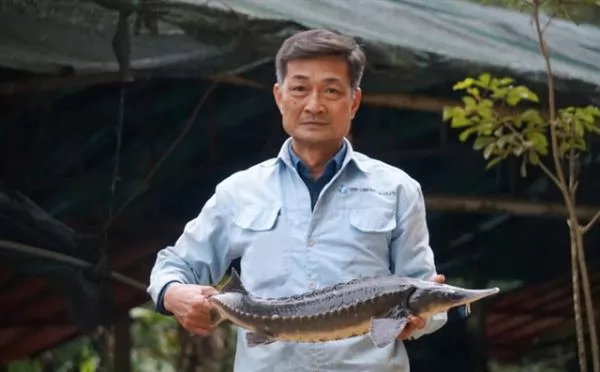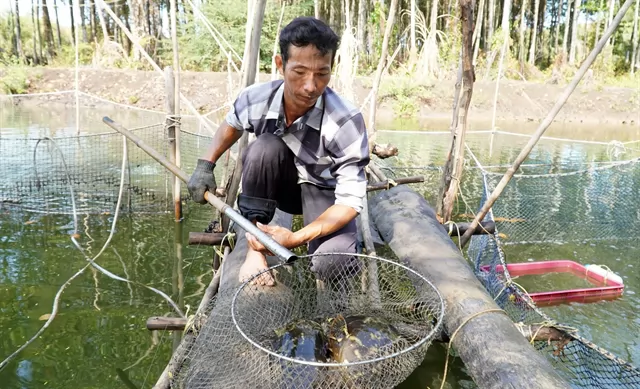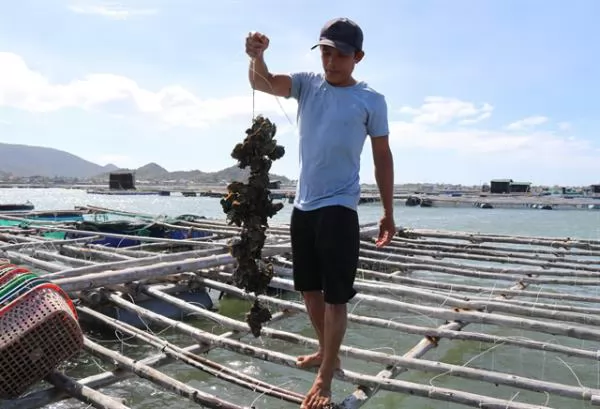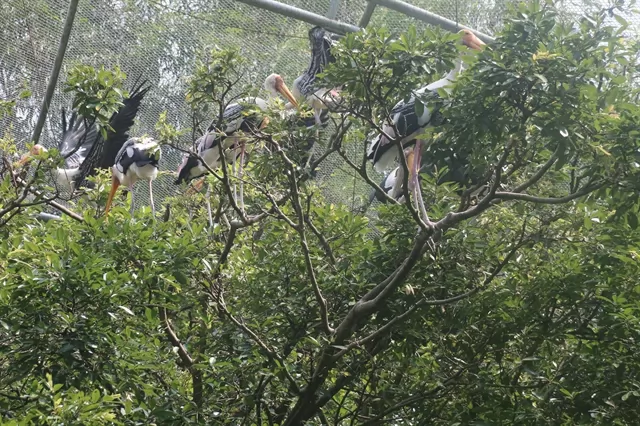Cold-water fish breeder in Thanh Hoá earns a high profit

Hà Khắc Sâm is the proud owner of a 300sq.m sturgeon and salmon farm in Thanh Hoá Province. Photo dantri.com.vn
Hà Khắc Sâm said on average each year he sells about eight or nine tonnes of fish, with a selling price of VNĐ400,000/kg for salmon and VNĐ250,000/kg for sturgeon.
THANH HOÁ A man in Lang Chánh District, Thanh Hóa Province brings in annual revenue of VNĐ2-3 billion, thanks to a 300sq.m sturgeon and salmon raising farm and ten years of passion for cold water fish.
Hà Khắc Sâm said on average each year he sells about eight or nine tonnes of fish, with a selling price of VNĐ400,000/kg for salmon and VNĐ250,000/kg for sturgeon.
After deducting expenses, he takes a profit of VNĐ500-600 million per year.
His fish farm has created jobs for seven local labourers with a salary of VNĐ6-7 million a month each.
Chairman of Trí Nang Commune People's Committee, Trịnh Đức Hùng, said Sâm's cold-water fish farm was a typical economic model of the commune.
"The local authorities are also encouraging and ready to support households to expand cold water fish farming businesses.”
Pù Rin mountain, in Năng Cát Village, Trí Nang Commune, Lang Chánh District, has a temperate climate, with an average temperature of 11 to 23 degrees Celsius, which is favourable for fish farming.
In 2009, after several surveys, the Thánh Hoá Province’s Department of Science and Technology built a pilot fish farming project at Tá Stream.
At that time, it was very difficult to choose qualified households with sufficient capacity for cold-water fish farming because investment in raising speciality fish such as sturgeon and salmon was very large.
Furthermore, the road from the Trí Nang Commune’s centre to the Pù Rinh Peak, where the Tá stream begins, was very dangerous and needed to be upgraded for travelling.
Lang Chánh District People's Committee choose Sâm's family and supported them with VNĐ200 million to implement the pilot model.
Sâm said: "I was selected by the local authorities to implement the pilot project, but at that time, I was more worried than happy!”
“Partly because I have no experience, and partly because this is a big project. If it fails, I lose all my assets after many years of accumulation.”
The first thing Sâm did was to upgrade the road to Tá Stream.
After that, he went around salmon farms in Sa Pa Town in Lào Cai Province to learn techniques for raising and taking care of fish. After mastering techniques, he decided to mobilise capital of nearly VNĐ3 billion to build three fish-raising ponds and two water reservoirs.
He bought 6,000 fingerlings to raise the first batch of salmon and in mid-2011, sold his first batch of salmon but did not make a profit.
The reasons, he revealed, were the high investment costs leading to a high price of salmon, Furthermore, there was no stable consumption market in Thanh Hóa Province, so he had to transport fish to Hà Nội, leading to a high mortality rate among the fish.
Then, disaster struck.
At the end of 2011, after heavy rains, Tá Stream overflowed into the fish-raising ponds, causing all the fish he raised to drift downstream.
"At that time, I lost nearly eight tonnes of fish, equivalent to more than VNĐ3 billion," said Sâm.
At that point, he considered giving up fish farming.
But, with bravery and determination, as well as the encouragement and support from the local authorities, friends and relatives, he decided to start over.
In 2013, he borrowed VNĐ1 billion from a local bank to build 11 more ponds and raise 4,000 salmon and 10,000 sturgeon.
Learned from his previous struggles, he actively began looking for a consumption market in Thanh Hóa Province and, at the end of 2014, sold all sturgeon and salmon to local restaurants.
"I earned more than VNĐ500 million in profit. It was the biggest turning point in the past 10 years for us," he said.
Sâm revealed that for cold-water fishes, the most important factor was the water source.
"The colder the water is, the fewer diseases the fish are exposed to."
Sâm plans to expand the farm and find more consumption markets in Hà Nội, Hải Phòng and Bắc Ninh.
He has developed a fish-raising farm as a tourism site in Năng Cát Village, a popular destination in Thanh Hoá Province. VNS
Maybe you are interested

Mekong Delta breeds aquatic creatures in forests to mitigate climate change effects
Breeding shrimp and other aquatic species in mangrove forests in the Cửu Long (Mekong) Delta both offers a steady income to households protecting forests and improves conservation.

Ninh Thuận expands marine aquaculture
The south-central province of Ninh Thuận is focusing on farming high-value marine fish, lobsters and bivalve mollusc to improve farmers' incomes.

$11.4mln expansion planned for Đồng Tháp Mười Ecological Reserve
Đồng Tháp Province plans to expand the 107ha Đồng Tháp Mười Ecological Reserve in Tân Phước 2 Commune.





